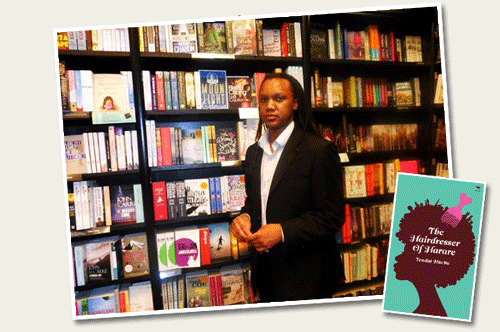
Germany based Southern Eye correspondent Khulani Nkabinde (KN) sat down with the author of the novel The Hairdresser of Harare, Tendai Huchu (TH) to discuss the book that has now been translated into Germany because of its popularity.
Below are excerpts of the interview.
KN: Was your book written while you were in Zimbabwe or you were already out of the country?
TH: I wrote the book in Edinburgh.
KN: What sort of issues and or experiences in Harare or Zimbabwe inspired you to work on the book?
TH: Like most writers of realist fiction, I draw material from ordinary day to day life. Zimbabwe is a gold mine for storytellers, especially in the last decade or so where a lot of interesting developments have happened in the country. Because the world is such a complex place, one of the great things about being a novelist is that your work becomes a simplified simulation of this complex reality, and that helps you, and, hopefully, others too to better understand the world.
KN: I know your book also touches on gay relationships among other things, a controversial topic on its own in Zimbabwe. Do you think that there is less openness in discussing issues to do with gays or lesbians in Zimbabwe?
- Chamisa under fire over US$120K donation
- Mavhunga puts DeMbare into Chibuku quarterfinals
- Pension funds bet on Cabora Bassa oilfields
- Councils defy govt fire tender directive
Keep Reading
TH: I honestly don’t know.
KN: President Robert Mugabe is on record having been bashing gays. Do you think his comments are a reflection of the general feeling in Zimbabwe?
The once you realise that the president is a Catholic who spent a great deal of his formative years tutored at a Jesuit institution, you see that his comments are consistent with that worldview. He is a politician and part of his appeal is his ability to reflect populist sentiment to the electorate. His speeches against homosexuality resonate because the majority of people agree with him on the matter. One only needs to see the flip-flopping and twisting that Morgan Tsvangirai had to do earlier this year, when he initially spoke out against homosexuality, but then because he has a Western constituency, he was forced to recant on the BBC, and then he had to pivot and say something else to the domestic electorate in Zimbabwe who, naturally, did not understand the change in his position. President Mugabe is consistent in this regard and his views are well known.
KN: Your book has received quite a lot of attention in Germany and has been translated to German. You have also addressed people in Germany in November (Munich) about your book. What was the general feeling towards it and what do you make of it being translated?
TH: It’s pretty cool to have it translated, and the readers, not only in Germany, but in Zimbabwe and around the world have been very kind about the book. It is humbling.
KN: Do you think there is sufficient support for writers in Zimbabwe?
TH: Writing, for me, is a solitary activity. All you need is a pen and paper and you’re away. The main problem for writers in Zimbabwe is the cost and availability of good books. You need to read a lot and learn from the masters in order for you to write. In Scotland I can go to any bookstore or on Amazon and purchase any book from around the world that I want. The average paperback costs something equivalent to what you earn for an hour’s work on the minimum wage here. This is not something I could even dream of doing in Zimbabwe. That is why your most prominent writers, NoViolet Bulawayo, Petina Gappah, Novuyo Tshuma, Brian Chikwava, and Irene Sabatini are all based abroad, or have lived abroad at some point, they have access to books that other writers in Zimbabwe probably do not, thus the work they produce is competitive at an international level. The only thing that I can think of which could help writers based in Zimbabwe would be better, well-stocked libraries, but I seriously doubt that is a priority for the state at the moment.
KN: Since this is your first published book, are you working on something new for now?
TH: I’m working on a new novel called The Maestro, The Magistrate, & The Mathematician.
KN: Who has been your biggest inspiration in writing?
TH: The Russian writer, Dostoevsky, is probably the reason I got into this, but I draw inspiration from every book I encounter. I try to read, at least, a book a week, when time allows.
KN: Tell us a little bit more about yourself and when you discovered your passion for the written word.
TH: It is very difficult to pinpoint when the passion started, was it when I was in Bindura Primary, which had a well-stocked library in the 80s, or was it in high school when I joined the school newspaper, could it have been in my 20s when I discovered the Russians? I think the answer is a series of lines that joins all these dots, and maybe even other factors I am unaware of.
TH: What is your profession and where are you based now?
I am a Podiatrist based in Edinburgh – and no I have not met JK Rowling, yet!













